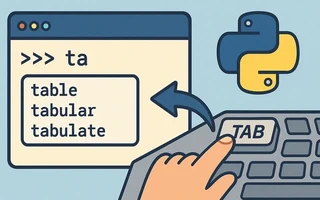Activar tab-completion en la Shell de Python

Crea el archivo
~/.pyrccon el siguiente contenido:$ cat .pyrc # ~/.pyrc # enable syntax completion try: import readline except ImportError: print "Module readline not available." else: import rlcompleter readline.parse_and_bind("tab: complete")
Si vas a usarlo solo en Linux, este try no es realmente necesario; lo puse alrededor de
import readline, ya que utiliza la biblioteca GNU readline, que puede tener algunos problemas
fuera de Linux.
Exporta la variable para que se lea cada vez que se abre una shell de Python (usa la ruta completa con
/home/usuario):julio@julio-acer ~> export PYTHONSTARTUP="/home/julio/.pyrc"Inserta esta misma línea en los archivos
.bashrcy.zshrc, para que la variable siempre se inicialice. En csh, la asignación de variables es diferente. Añade la siguiente línea a~/.cshrc:setenv PYTHONSTARTUP ~/.pythonrc"¡Listo! Pulsa la tecla TAB para mostrar la lista de posibles completados:
$ python Python 3.2.2 (default, Sep 5 2011, 04:52:19) [GCC 4.6.1 20110819 (prerelease)] on linux2 Type "help", "copyright", "credits" or "license" for more information. >>> import re >>> re. re.A re.__eq__( re._compile( re.ASCII re.__file__ re._compile_repl( re.DEBUG re.__format__( re._compile_typed( re.DOTALL re.__ge__( re._expand( re.I re.__getattribute__( re._pattern_type( re.IGNORECASE re.__gt__( re._pickle( re.L re.__hash__( re._subx( re.LOCALE re.__init__( re.compile( re.M re.__le__( re.copyreg re.MULTILINE re.__lt__( re.error( re.S re.__name__ re.escape( re.Scanner( re.__ne__( re.findall( re.T re.__new__( re.finditer( re.TEMPLATE re.__package__ re.functools re.U re.__reduce__( re.match( re.UNICODE re.__reduce_ex__( re.purge( re.VERBOSE re.__repr__( re.search( re.X re.__setattr__( re.split( re.__all__ re.__sizeof__( re.sre_compile re.__cached__ re.__str__( re.sre_parse re.__class__( re.__subclasshook__( re.sub( re.__delattr__( re.__version__ re.subn( re.__dict__ re._alphanum_bytes re.sys re.__doc__ re._alphanum_str re.template(
Alternativas
Existen shells de Python mejoradas, como iPython. Es bastante simple, interactiva y contiene varias funciones interesantes, incluido el autocompletado.
La wiki oficial sugiere otras.

Soy un ingeniero informático brasileño radicado en Alemania, apasionado por la tecnología, la ciencia, la fotografía y los idiomas.
Llevo programando cerca de dos décadas, explorando desde apps móviles y desarrollo web hasta aprendizaje automático. Hoy me enfoco en SRE en la nube e ingeniería de datos.
Soy voluntario en las comunidades de open source y Python, ayudando a organizar PyCon DE y PyData Berlin, dando mentorías y contribuyendo con código y traducciones.
En mi blog comparto consejos de Linux, guías de configuración y notas personales que escribí como referencia futura. Espero que también sean útiles para otras personas. El contenido está disponible en varios idiomas.
Visita mi galería para ver algunas de mis fotografías.
Fuera del teclado, me encontrarás en conciertos, tocando el clarinete, en bicicleta, buceando o explorando nuevos lugares, culturas y cocinas.
¡Siempre feliz de conectar! 🙂